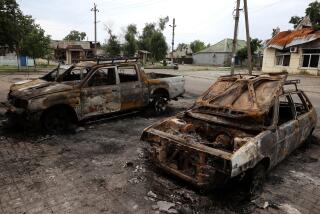Why U.S. Should Not Use Chemical Weapons : Nothing Iraq does need cause abandonment of moral belief
- Share via
Saddam Hussein warns that he is ready to use every weapon in his arsenal against the forces that have mobilized to drive him out of Kuwait, and the ruthlessness of the source makes it impossible to disregard the threat.
Iraq’s arsenal includes chemical and biological weapons. Most Western experts think that Iraq’s missiles aren’t able to deliver these weapons, at least not in any effective way. But Iraq does have bombs and artillery shells armed with chemical agents, and probably biological ones as well. For the time being the bombs are the lesser threat, and should remain so as long as most of Iraq’s best planes are grounded in Iran. But tens of thousands of U.S. and other allied forces in Saudi Arabia are within range of the many artillery pieces that Iraq has in Kuwait and in Iraq proper. There’s no reason to think that Saddam Hussein will necessarily wait for these forces to begin moving into Kuwait before ordering his terror weapons turned against them. And then?
And then the President of the United States, with or without the concurrence of his coalition partners, will have to make a decision that, however it goes, is certain to evoke the most profound moral anguish.
If Saddam again uses the terror weapons he has used before, first against Iran and later against his own Kurdish population, will the President order U.S. forces to respond in kind? Should this country use unconventional means of destruction to punish Iraq’s army for an outlaw act? The answer in all cases must be no.
THE EASIER CALL: With regard to two classes of weapons, the response is clear. There would be no military need and no moral justification to use either tactical nuclear weapons or germ agents against Iraqi forces. Their use is unthinkable. Nuclear weapons have in fact been ruled out by high officials.
The United States, along with most other countries--including Iraq--is committed by treaty not to use poison gases or other chemical agents in war. If Iraq should again betray its commitment, however, its victims would clearly be entitled to retaliate. Thus the need for the President’s fateful decision: If American and other coalition forces come under chemical or biological attack, should U.S. chemical weapons be launched against Iraq’s army?
THE HARDER QUESTION: It may be, as White House Chief of Staff John Sununu has suggested, that the decision has already pretty much been made to abjure chemical weapons, whatever Iraq may do. Let’s hope so.
Such a decision would be dictated by the moral belief that the United States must not take on the characteristics of its enemy by using a weapon that, ever since World War I, has aroused particular horror and revulsion. Such a decision would be dictated by the political consideration that using chemical agents would simply risk too great a loss of international support for the anti-Saddam effort. Or the decision could rest on the emotionless calculation that there are more effective ways to kill and disable an enemy than by throwing toxic agents at him.
These are understandable and even admirable reasons for refusing to be goaded into fighting a war at Saddam Hussein’s inhumane level. But they are not necessarily the last word. If Iraq attacks with chemical agents, would American public opinion and the mood of the U.S. forces who were under attack allow the President to order that a response be limited to conventional means alone? And what if Iraq began spreading anthrax or some other deadly biological agent over the battlefield? Could Bush continue to resist pressures to use similarly horrible weapons in revenge?
He must. These are unthinkable weapons of war and the United States must not use them in anger, in regret or under any circumstances. We can, we must, we will, win this war without them.
More to Read
Sign up for Essential California
The most important California stories and recommendations in your inbox every morning.
You may occasionally receive promotional content from the Los Angeles Times.













